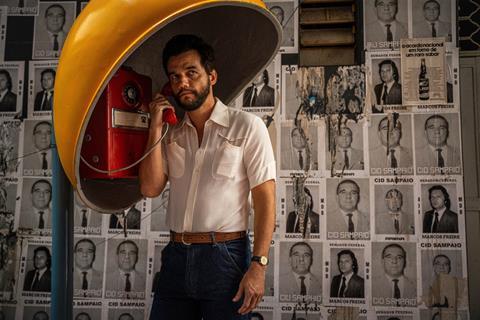
Brazilian cinema is enjoying a hugely successful year, with Walter Salles’ I’m Still Here winning best international film at this year’s Academy Awards, Gabriel Mascaro’s The Blue Trail scooping the Silver Bear grand jury prize at the Berlinale, and Kleber Mendonça Filho’s The Secret Agent in Competition at Cannes Film Festival.
So with Brazil’s selection as country of honour at the Marché du Film (May 13-21), the timing could not be better for the launch of São Paulo State Film Commission.
“It’s a rare combination of factors that have aligned favourably and brought about the ideal scenario for the promotion of Brazilian cinema worldwide,” says André Sturm, president of the international promotion and marketing body Cinema do Brasil. “We could not have arranged the events better ourselves.”
São Paulo State Film Commission is an initiative of the São Paulo State government and the São Paulo Museum of Image and Sound (MIS), of which Sturm is director. “We welcome the idea of São Paulo state as a film destination,’’ says Sturm. “[Accounting for a third of Brazil’s GDP], it is one of the most developed states in Brazil, with excellent transport infrastructure, plentiful skilled labour and great film laboratories and equipment.
“The launch of São Paulo State Film Commission is in sync with the work Cinema do Brasil has been doing for 20 years, which includes encouraging co-productions and bringing international teams to film in the country.”
Key partner
The commission’s debut in Cannes aligns with France’s role as a key partner to Brazil. France is one of Brazil’s most frequent co-production partners, along with Portugal and Argentina. According to Brazil’s film agency Ancine, the territory has partnered France on 94 co-productions since 2002.
This year also marks Brazil-France Season, a cultural exchange initiative celebrating the 200th anniversary of diplomatic relations between the nations.
“This is an extremely symbolic and strategic moment for Brazil, and the government of the state of São Paulo understands that it’s the ideal time to project the appeal of our talent, public policies and infrastructure to the world,’’ says Marilia Marton, São Paulo state secretary of culture, creative economy and industry. “São Paulo aims to be not only a protagonist within Brazil, but a connection point with the world, a place where Brazilian cinema meets international cinema.”
Marton’s agenda in Cannes includes presenting the progress of the State Audiovisual Plan, which launched in February at Berlin, of which São Paulo State Film Commission is a part.
“We hope São Paulo will become a solid alternative for international productions seeking diversity of landscapes, incentives and operational flexibility,’’ says Marton, also highlighting the ethnic and cultural diversity of the state, whose residents include Italians, Japanese, Lithuanians, Afro Brazilians and northeastern Brazilians.
Until now, only the city of São Paulo has had its own film commission. Created in 2016, it provided assistance to more than 1,100 productions in 2024. “With the expansion to the state level, we have the potential to attract large-scale productions, especially from Europe and North America, boosting Brazil’s image as a competitive and reliable destination,” says Marton.
At Cannes, Marton is also representing CreativeSP, a showcase for the region’s creative economy, developed in partnership with investment promotion agency InvestSP. This will be CreativeSP’s fourth mission in Cannes, bringing audiovisual companies from São Paulo with the aim of generating business, partnerships and foreign investment.
Opening doors
All business meetings, along with co-production meetings and networking events, are focused on the Cinema do Brasil stand, which supports more than 60 national companies. It is managed by the São Paulo State Audiovisual Industry Association (SIAESP) in collaboration with the Brazilian Trade and Investment Promotion Agency (ApexBrasil).
“We hope to open many more doors, whether for new co-productions or film sales, as well as invitations to other international festivals,’’ says Sturm.
At Cannes last year, Cinema do Brasil registered 1,099 meetings with representatives from 53 countries. A total of $11.5m of business was generated, with an expected $61.9m in transactions over the course of a year. The initiative resulted in nine co-production contracts and distribution deals for Brazilian films with 18 countries, while six films were invited to international festivals.
“This year, with the presence of the Ministry of Culture of Brazil and the Audiovisual Secretariat (SAv), we are practically the country’s embassy in Cannes,’’ says Sturm, with a smile.




























